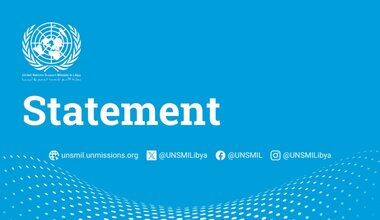Fostering civic space is key to any political process and a catalyst for change, say Libyan youth on International Youth Day
TRIPOLI – 13 August – Over 20 Libyan young men and women gathered in the UN compound in Tripoli to share their ideas in a workshop on fostering civic space to mark International Youth Day.
The workshop, held yesterday, focused on the identifying the most effective ways youth could use civic space to influence policy changes, leverage mechanisms to ensure fair and transparent electoral processes and how youth-led initiatives to promote civic space could be better supported.
“A vibrant civic space is essential for a healthy democracy,” said Suki Nagra, Director of Human Rights, Rule of Law and Transitional Justice in UNSMIL who joined the workshop. “It allows citizens, civil society organisations and other groups to freely express themselves, participate in decision-making processes, and hold their governments to account.”
Through discussions in breakout groups, the young men and women in the workshop made the following recommendations:
-
Civic space needs to be expanded and protected: restrictions on civic space need to be reduced; creating a secure environment for civil society to engage with communities should be seen as working alongside the state, not detracting from it.
-
More needs to be done to raise awareness of what civil society is, so that misconceptions and misinformation do not take root in wider communities.
-
Social media represents an opportunity for civil society to influence decision-makers and to rebut misinformation.
-
Civic space must include all segments of society including women, cultural components, community leaders and those with disabilities, and they should be reached through targeted campaigns on social media, and approrpiate communication channels .
-
Youth resilience needs to be built to ensure they can engage consistently in the discussion and continue to advocate throughout the lobbying process.
-
More needs to be done to bring civil society together to collaborate and work on shared goals and commitments and encourage members of the public to join them; civil society organisations should be encouraged to with partner national and international organisations to share experiences and knowledge.
-
More needs to be done to educate communities on peaceful dialogue and how to engage in healthy debates, as well as how to fact check information. Language used needs to be carefully considered.
-
Youth need to be educated more about their rights and how they can engage in the electoral process as candidates and voters and in their role in promoting voter participation at the municipal level.
-
Establish focal points across Libya to build a network of youth and civil society organisations who work with local communities to provide workshops and skills training on key topics.
“Civil society is the engine behind any political process and youth can be the catalyst for change,” said one workshop participant. “Civil society groups should work together more and collaborate on the issues where they complement each other so that they have more influence,” said another.
The workshop was part of UNSMIL’s new youth strategy – YouEngage, which aims to engage with 1,000 young men and women by May 2025 through workshops, trainings and advocacy sessions. Many more sessions are organized and are communicated using UNSMIL’s youth groups on Facebook and LinkedIn.
 United Nations Peacekeeping
United Nations Peacekeeping UN
UN
















